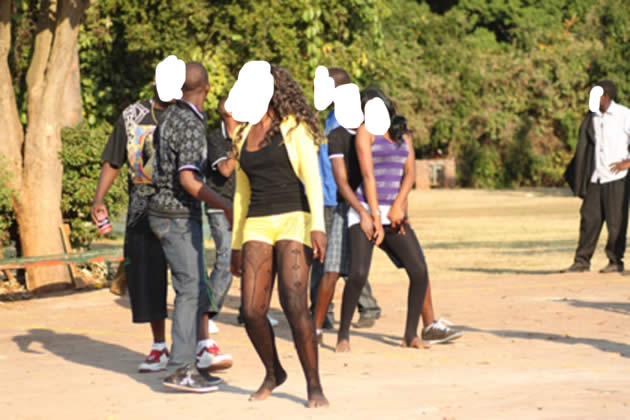Teens living in the fast lane


Peer pressure, coupled with the need to test new things with friends has left most teens vulnerable, especially when they drink excessively
Roselyne Sachiti Features Editor
SIX teens try to “resuscitate” their friend who has just bowed to the majesty of alcohol outside a bar in Harare’s Avenues area.
Though his friends claim he is 19, the intoxicated teen appears something between 15 and 16. It’s getting dark and the friends are visibly worried. In the seconds that follow, skimpily dressed intoxicated girls protrude from car windows and roofs holding bottles of different brands of alcohol.
They block a busy road.
It is New Years’ eve and the teens stun older patrons.
A combination of vices on this particular day leaves a first timer believing they are in the United States popular town of Las Vegas also known as Sin City.
For the teens, the cliché “what happens in Vegas stays in Vegas” perfectly fits like a glove. What happens there should not be known home.
Investigations by The Herald reveal the “dark” world and double lives led by teens, most of whom are students in secondary schools and private colleges.
The teens seem to belong to groups for easy identification.
We pick there is the Wingwar, Wutang and Pinksquad group, among others.
One clan is wearing animal print tops and the other American flag prints. Others are in blue and grey silverfish outfits with their nicknames inscribed.
Some are in the restaurant others are milling and dancing outside making a nuisance blocking traffic.
Two girls open the boot of a Toyota Vitz and fish out a bottle of brandy.
They pour the contents into a tumbler, gulp and dash back into the bar.
While others, despite being clearly below 18-years-old are buying beer from the restaurant and the bartender is not concerned by their age.
Zimbabwe outlaws the sale of alcohol to persons under 18 years.
But despite this, many are breaking the law and going unpunished.
“We accommodate the teens because the business is run as a restaurant not a nightclub or bar,” says Maria, a waitress who is at pains to justify why they sell alcohol to these youths.
As the day progresses the youths become more intoxicated.
It is chaos!
There is screaming and staggering, then vomiting. The air outside is heavy with cigarette and marijuana smoke. Two girls are spotted smoking a cigarette.
Fights over girls often break out.
At 6pm, all the teens leave. Remaining in the restaurant is a deathly silence and many empty beer bottles and cans.
The party is officially over but most teens still want to have fun.
They move on to an adjacent restaurant, staying there for only 30 minutes before their unruly behaviour gets them thrown out. They then go to a bar along Samora Machel Avenue, where like a swarm of bees, the invade the joint, leaving regular patrons scampering for cover.
They seem to be in search of the legendary “Loch Ness Monster” as in the dead of night, they continue to move from one bar and nightclub to another.
Most of the teens are from well-to-do families and have enough resources.
Such teens, who have easy access to cash are the enablers of their peers’ drinking habits.
They never run out of friends.
In a day, they will patronise as many bars as their pockets last them.
The amount of beer they drink, no one knows as they too are not sure.
Investigations revealed that the parties are organised by a group of older guys who communicate with the teens using social platforms like WhatsApp and Facebook.
The organisers select and book a certain restaurant/bar. They promise to bring many patrons and that these would buy beer and food. The organisers then bring their own PA system and barricade the section they would have hired. They then collect gate-takings from the hordes of teens who pay varying fees to enter.
At some bars, regular patrons are allowed in but not into the area where the teens will be. This does not mean they are safe from the prying eyes of older men.
While statistics of under-age drinkers that are sexually abused while intoxicated are not readily available, society is worried that teenage girls are at high risk of both unwanted pregnancies and sexually transmitted diseases.
Peer pressure, coupled with the need to test new things with friends has left them vulnerable, especially when they drink excessively. It is becoming exceedingly worrying.
Council of Social Work Registrar Mr Makhalima Mlilo, is concerned that alcohol abuse by youths is becoming a leading public health problem in Zimbabwe. The first worry is that alcohol is the most accessible drug of choice among the youth. As such, most are exposed to drinking at an early age and end up with health problems associated with drinking, he says. He dissects the problem.
“As children grow up, they encounter problems associated with adolescence such as the feeling of independence and changes in their lifestyle.
“The transition from childhood into adolescence and into young adulthood has been associated with alcohol abuse,” he points out.
Some of the behavioural and physiological factors that converge to increase or decrease a person’s risk for alcohol problems, including tolerance to alcohol’s effects, may be directly linked to genetics, says the expert.
“For example, being a child of an alcoholic or having several alcoholic family members places a person at greater risk for alcohol problems. “Children whose parents or main carers are alcoholics are more likely to begin drinking at a young age and progress to drinking problems as they grow up.
“We also have to consider the environment our children are growing up in. Drinking behaviour reflects a complex interplay between inherited and environmental factors.
“Environmental factors, such as the influence of parents and peers, also play a role in alcohol use. Parents who drink more and who view drinking favourably may have children who drink a lot as well.” In Zimbabwe, it is a common pattern for parents and carers to ask their children, some as young as 9-10, to go and buy alcohol at the local bottle store.
“This is besides the fact it is illegal to sell alcohol to minors. I’m yet to hear of a single case in which a person was prosecuted for selling alcohol to a minor in Zimbabwe,” he complained.
He added that hiking the price beyond the reach of many young people, increasing the legal drinking age to 21 years old could be effective interventions.
“Enforcing the law — making sure those who sell alcohol to those below the legal drinking age are caught and successfully prosecuted. This includes parents and carers who expose minors to alcohol by sending children to buy alcohol for them,” he added.
He also said there was need to develop a structured prevention programme run at national level, a fact that may be helped by the Ministry of Public Service, Labour and Social Welfare setting up a directorate specifically to look at child welfare issues in Zimbabwe as part of strengthening the Social Protection system.
Social Protection and Community Development Consultant Mr Msekiwa Makwanya, says teens are notorious for imitating what they see on TV where people are mostly actors.
“Unfortunately for us Africans, we have not developed powerful or attractive media programmes for our young people and they copy from the West if not the worst from other countries.
“One of the reasons why the media especially radio and TV should show local content is precisely to communicate values of your society.
“But with globalisation, especially social media, we are in trouble. We need to address a clear identity crisis in our teens,” he says. He adds that police, and social workers, particularly in the Department of Social Services and its partner agencies, should be notified when such things happen.
“Parents who allow their children to frequent these places should be charged with neglect,” he adds.
Harare Province acting police spokesperson Assistant Inspector Tarirai Dube says: “In a case where one has bought alcohol but is under 18 years, the owner of the outlet will be arrested for allowing such to happen.” She adds that in the event that a minor is arrested for consuming alcohol or any other criminal offence, that child goes through the trial diversion process where the authority to prosecute comes through the Attorney General’s office.
Any person who sees under-age children drinking beer or a bar owner selling alcohol to minors can report both to the police, she says. “Teens who mill around and block roads can also be arrested for contravening Section 46 of the Criminal Law Codification and Reform Act,” she cautions.
Asst Insp Dube adds that some bars are in compliance with the law and do not allow under-age patrons.
Feedback [email protected] Or [email protected]







Comments